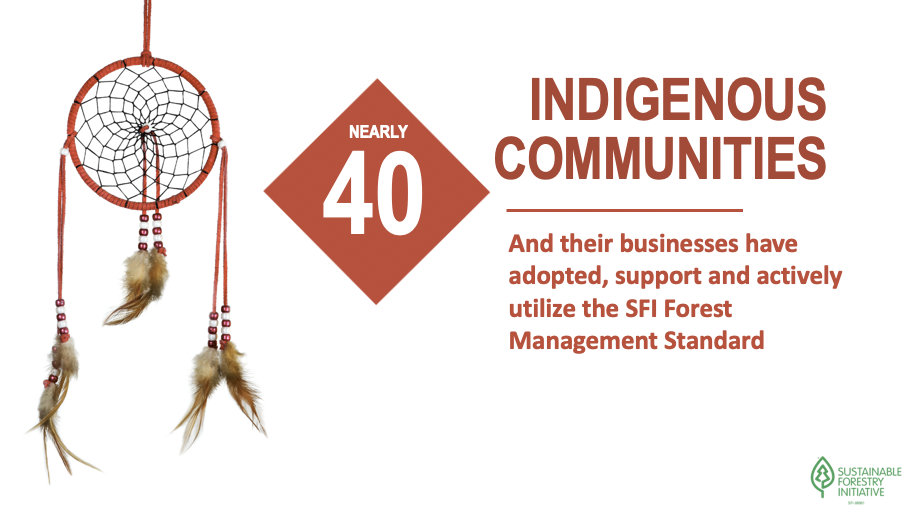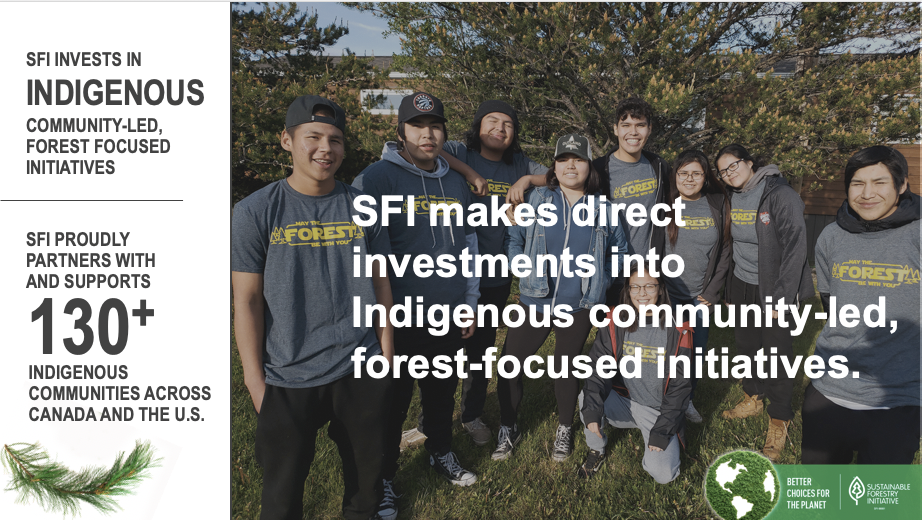SFI has a proud history of forest-focused collaboration with Indigenous Peoples. Every day, we strive to co-create meaningful change, while also listening, learning, and growing as an organization to become the best possible partner we can be.

But I’m even more excited about how this webinar fits into the bigger picture when it comes to SFI and the relationships and partnerships we have with Indigenous communities, organizations, and businesses.
Partnering in forest-focused collaborations
SFI has proudly partnered with and supported more than 120 Indigenous communities across the U.S. and Canada. We are also proud to partner with leading organizations like the Canadian Council for Aboriginal Business, the Outland Youth Employment Program (OYEP), and Habitat for Humanity Canada’s Indigenous Housing Partnership.
These partnerships, which we are working to build on every day, speak to SFI’s mission to advance sustainability through forest-focused collaborations. They also underscore our flexible, respectful approach to relationship building, that helps us to effectively address the issues and needs that matter most to each of our community partners.
SFI works across four pillars: standards, conservation, community, and education
SFI is able to offer itself as a facilitator and partner in many ways because of our interconnected work across four pillars: standards, conservation, community, and education. Our work with Indigenous Peoples stretches across all four.
Standards

At the same time, many small Indigenous communities have told us that they face various barriers to certifying community-managed forestlands. To address this, the SFI Small-Scale Forest Management Module for Indigenous Peoples, Families, and Communities was created as a way for Indigenous communities to combine resources to increase access to forest certification. The SFI Forest Partners Program also provides certification readiness supports, to further reduce financial barriers and increase access to certification for Indigenous communities.
Through the SFI Standard Revision Process we’ve already heard from our network that the way forward is one rooted in rights recognition and relationship development. That’s why the Draft Enhanced Objective 8 has been crafted to both reflect and promote a meaningful rights recognition and relationship-building process with Indigenous Peoples in the forestry sector.
Conservation
We also make direct investments in conservation projects led by Indigenous communities. SFI grants have helped secure more than $2 million in leveraged funding these community-led initiatives. Some of the projects we have collaborated on include:
• Bringing Elders and youth together through cultural heritage resource assessments
• Culturally modified tree databases and management systems
• Post-harvest culturally significant plant regeneration
• Sustainable management of culturally important species for traditional harvesting
Community

Our Indigenous Youth Skills Training Fund, offered through Project Learning Tree Canada, an initiative of SFI, exemplifies this approach. The fund provides Indigenous communities with the opportunity to design and deliver community-based skills training initiatives that connect local youth with the outdoors and enhance their employability in the forestry and conservation sectors.
One community might say the funding for a youth skills training program would be best used for first aid certification. Another community might say chainsaw safety training would be the best investment in their youth. And yet another might facilitate land-based traditional knowledge exchanges between local youth and Elders. These kinds of decisions get made at a grassroots level. SFI’s role is to listen to what our partners say and do what we can to meet their unique needs.
One of the highlights of our community partnerships is our collaboration with the Outland Youth Employment Program. Since 2018, the SFI network has contributed approximately $1.5 million to OYEP.
This funding was facilitated by PLT Canada and the SFI network. OYEP is a six week land-based employment experience providing training and education for Indigenous youth, aged 15 to 22, including at-risk youth from rural and remote communities. In 2019, SFI signed a memorandum of understanding with OYEP that supports our continued advancement of meaningful opportunities for Indigenous youth in the forestry sector.
Education
Since 2018, PLT Canada has placed over 300 Indigenous youth, from more than 80 Indigenous Nations, in green jobs in the forestry, conservation, and parks sectors. Many of these youth found placements in their own communities. These jobs offer the learning opportunities and skills training Indigenous youth can use to become future forest and conservation leaders.
In 2020, PLT Canada has committed 50% of our available Green Jobs positions to First Nation, Métis and Inuit youth—that’s over 250 meaningful outdoor jobs! PLT Canada’s mentorship program is connecting Indigenous youth and professionals working in green jobs.
All people and all communities have an opportunity to value forests
My professional, community, and academic career has been spent at the interface between Indigenous communities, non-Indigenous governments, and a diverse range of non-governmental partners—including forest sector organizations.
Over and over again, I have seen firsthand how fostering inclusive, collaborative approaches to policy, program, and relationship development leads to real progress on the ground. I would invite you to join our standard revision webinar on Indigenous Peoples’ rights and relationship building on June 8. Together, we can learn, grow and do so much more!
